| Visual Arts | U.K. | ||||||||||||||||||||||||||||||||||||||||||||||
BAFA © 2010. All material here is copyrighted. See conditions above. |
Richard Paton
|
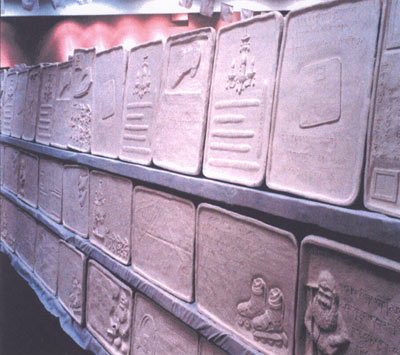 Prayer Wall, 1998, a detail of the wall of plaster casts, by Richard Paton, U.K. |
In Tibetan Buddhist Mani walls, prayers and incantations are carved into slabs of rock beside a path. Richard Paton made his own 'Prayer wall' inspired by these. They are about the ‘spirituality’ of materialism. He took the images from a British catalogue of consumer items. The accompanying texts, translated into Tibetan, are sales pitch slogans about the items presented. The well-crafted brick-shaped reliefs with Tibetan texts appear to be celebatory or commemorative, but are in fact advertisements. Goods for sale, but clothed in a form suggestive of the contemplative, looking as if they have been weathered by nature.
|
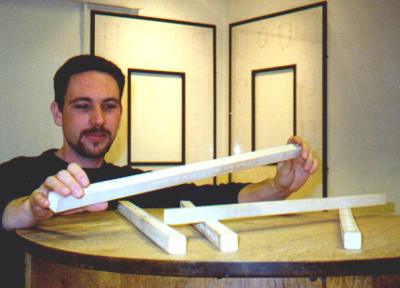 Richard Paton handling Certain Measures by Sonja van Kerkhoff. Portrait Whispers by Emma Pooley is hanging behind him.
|
There were a number of factors that prompted me to curate this exhibition, which I called
Image defining Word defining Image. The first was that my own personal art practice has been concerned
lately with language, its visibility in public spaces, and its sometimes indefinability in the context of exploring
human experience. I’ve been using language, which is the primary vehicle of communication, and integrating it into
image making, with the hope that the communicative power of my work would become more potent and fertile...
|
The ideas in the exhibition were as complex as they were varied. There’s a fuller explanation of the work in the catalogue I made after the exhibition. As I mentioned before, my own practice is politically motivated. I view art as a vehicle of refined communication and a point of discussion. The practice of making art in the field of cultural production means entering into a discursive process. Art isn’t a valuable commodity to be treated like expensive furniture, its function is to convey ideas - the better the ‘art’, the more attention it receives, the more the issues at stake are discussed. In my 70% Water (also exhibited), I hoped to raise several issues; namely, authenticity, cultural tourism and museum collecting. In the piece, five antique display boxes housed test tubes containing water from various sources. The source of the water was explained in various languages engraved onto brass plaques behind the protective glass inside the box. For example, one has the text: Early morning dew collected from four leafed clovers in engraved in Celtic on the glass with an English translation below. The labelled water functions as clichés in the particular cultural settings. I think the standard museum practice of representing ´other´ cultures as static displaces and misrepresents those cultures as confined in a linear past. I’d like to see all ideas represented equally in the present without hierarchial Eurocentric domination. |
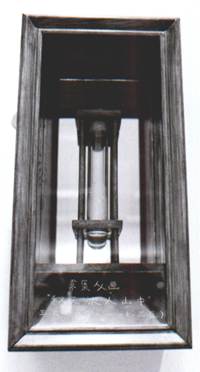
70% water by Richard Paton. Detail of one of five boxes ( 32 x 16 x 13 cm). The text, Mist gathered from the painting "Travellers among the mountain in Autumn by Wang Yun (1652 - 1735)" is engraved in Chinese on the glass with an English translation below. |
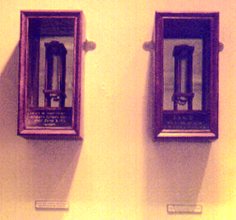
|
About the exhibition curated by Richard Paton and the workshops he gave. View other work and his stain glass business at: http://www.rainbowglassstudios.co.uk Sites with some of his art projects, works and installations: http://www.users.globalnet.co.uk www.adbusters.org Email: richard.paton@gmx.co.uk |
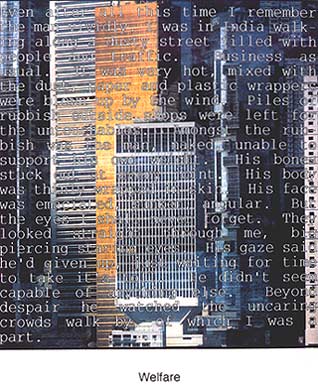
|
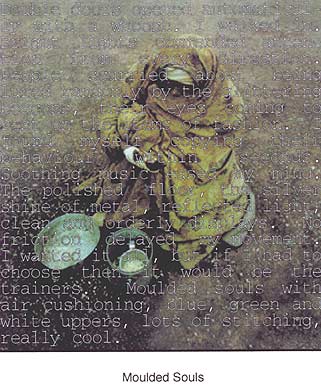 Polaroids, 1998 |
|
Arts Dialogue, Dintel 20, NL 7333 MC, Apeldoorn, The Netherlands email: bafa@bahai-library.com |